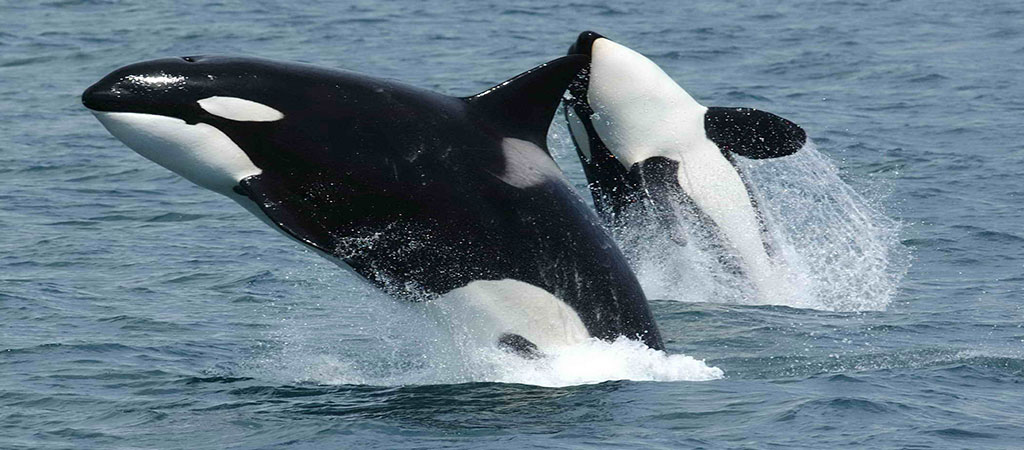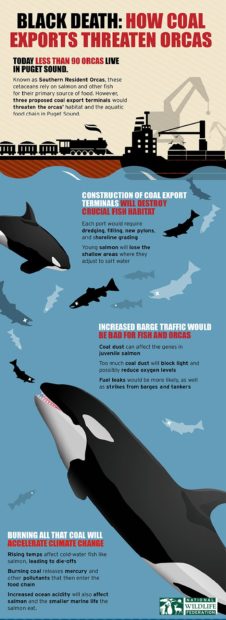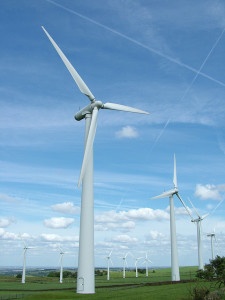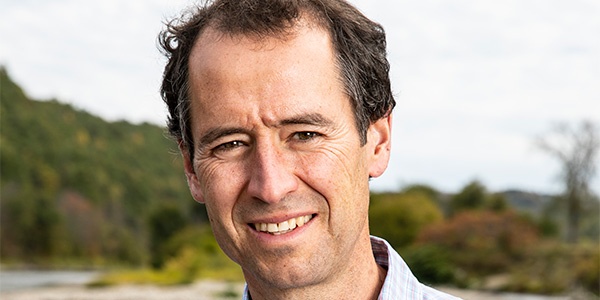We have much more to do and your continued support is needed now more than ever.
Victory for Wildlife Over Costly Coal

Opposition to the high costs of coal to wildlife, fragile habitat, and tribes were heard again on May 9th, when the U.S. Army Corps of Engineers denied the Gateway Pacific coal export terminal proposed for the Puget Sound coast in Washington.
The massive Gateway Pacific coal export terminal was designed to transport up to 54 million metric tons of mostly coal per year – threatening fishing and wildlife, including salmon and endangered orca. In its decision to deny the terminal, the Corps focused on concerns over historic fishing rights of the Lummi tribe. These rights would have been interfered with by major docks that would cover 144 acres of water and vessel traffic that would significantly increase interference with fishing. The denial also is a significant victory for wildlife like orcas.
Please join us in thanking the U.S. Army Corps of Engineers for their decision: post a “thank you for protecting orca in Puget Sound by denying the Gateway Pacific coal export terminal” message on the U.S. Army Corps of Engineers Facebook page.
 Win for Orcas
Win for Orcas
Coal export terminals along the Pacific Northwest coast would devastate the aquatic food web that orcas depend on by increasing acid rain and mercury pollution from burning coal — harming the salmon that orca need for their survival. Additionally, the impacts from thousands of new cargo ships of coal pushing through the harbors and estuaries of Oregon and Washington will bring harm to orcas and their fragile marine habitats.
Today, fewer than 90 orcas live in Puget Sound. Known as Southern Resident Orcas, these cetaceans rely on salmon and other fish as their primary source of food.
Now five of six major proposed port projects in the storied waters of the Pacific Northwest have now been cancelled or denied. This means salmon and orca will not be threatened by the pollution and traffic these ports would have created. It means that ancestral fishing grounds will remain undisturbed. It means that coal will not be exported and burned, adding to global climate change that is threatening all wildlife. Salmon runs in the Pacific Northwest are in trouble as rivers run too warm and the cycle of snow melts change that make streams and rivers prime spawning habitat.
The denial of the Gateway Pacific Terminal Project was the result of years of unwavering opposition. The Lummi and other tribal nations, the National Wildlife Federation, anglers like those represented by NWF’s regional affiliate the Association of Northwest Steelheaders, recreational kayakers and boaters, and friends of wildlife across the country have consistently pointed out the threats to wildlife and cultural resources that are the lifeblood of the irreplaceable natural world in the Pacific Northwest.
Accounting for Costs of Coal
The Gateway Pacific Terminal project is just the latest of several coal projects that have been cancelled or denied. Tribes, conservationists, and communities are demanding that the massive impacts of the coal industry to wildlife, including decades long failures to reclaim habitat and waters stripped mined and laid barren, be considered and accounted.
It is not just coal export projects that have met resistance. Other cancelled coal projects include the Otter Creek mine, the largest proposed mine in the United States that would have also impacted local tribes as well as a choice wildlife area in eastern Montana, and the related Tongue River Railroad, which would have moved coal from mine to port threatening elk, mule deer and other wildlife along the way.
Like the Otter Creek mine, which was cancelled by recently bankrupt Arch Coal, the Gateway Pacific Terminal was largely backed by another bankrupt coal company, Peabody Energy. The shaky financial conditions of these companies makes it even more important that the high costs of these project be accounted. It is clear that bankrupt coal companies – which have historically failed to clean up their pollution – are unlikely to meet basic required environmental protection measures, whether at the mine or at the port.
A Better Energy Future for Wildlife

The denial of the port proposal was the result of communities asking for a better energy future and standing up for wildlife, native culture, public health, and our climate. These victories come from a deep desire to protect the land and water that sustains us, and a growing demand for responsible energy development.
We no longer need to accept decades or centuries long pollution and devastation of our land and waters. Instead, people are standing up for a clean, wildlife-friendly energy future that safeguards our rich wildlife and outdoor traditions.






















